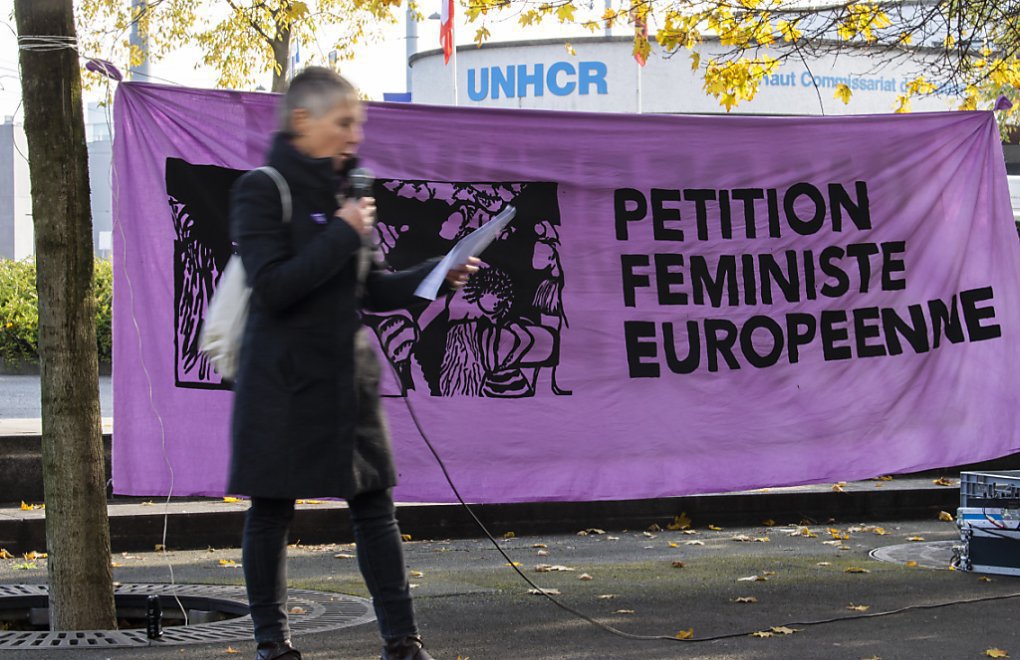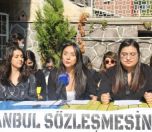Click to read the article in Turkish
A group of activists and associations fighting alongside asylum seekers in Europe call on everyone to sign the "European Feminist Petition".
The petition demands the recognition for an effective recognition of the specific grounds for asylum for women, girls and LGBTI+s.
Launched on November 11, the campaign is expected to last till May 11, 2022, the anniversary of the İstanbul Convention's opening to signatures. The signatures will be submitted to Brussels on this symbolic day.
Click here to sign the petition
World Women's March Turkey Coordination (Dünya Kadın Yürüyüşü Türkiye Koordinasyonu), KAOS Gay and Lesbian Association and SES Equality and Solidarity Association from Turkey have also signed the petition.
As of 10.43 am local time in Turkey today (November 15), 2,434 people had so far signed the European Feminist Petition.
The full petition reads as follows:
European Feminist PetitionSexual and gender-based violence (including domestic violence, sexual exploitation, forced marriage, genital mutilation, trafficking, discriminatory legislation, repudiation, deprivation of their children) pushes many women, girls and LGBTIQA+ people to flee their countries and seek asylum in Europe. These people are almost systematically exposed to violence and exploitation along the migration route: sexual violence by smugglers or in refugee camps, sexual exploitation or forced labour and confinement in trafficking networks in transit countries, including in European countries, threats, trauma and danger to their children. When they arrive in Europe, inadequate asylum procedures and an unworthy reception await them. Asylum procedures fail to identify victims of gender-based violence or trafficking, accommodation facilities are inadequate, support measures are lacking. And their specific grounds for asylum are often not recognised, despite the principles set out in several EU directives and the provisions of the Istanbul Convention which recognises gender-based violence against women as a form of persecution giving rise to international protection. We, the people of Europe and the world, call on the European Commission, the European Parliament, the European Council and the national governments of the Schengen area to: 1 Guarantee the right to international protection through the effective recognition of any specific asylum grounds for women, girls and LGBTIQA+ people. We ask that such recognition be guaranteed to any victim of gender based violence, woman, girl or LGBTIQA+ person, by integrating the particular needs of these persons, and those of the children who accompany them if necessary, at all stages of the asylum procedure and reception. Such a guarantee includes systematic access to structures for identifying and supporting victims of trafficking and violence based on gender and non-heterosexual sexual orientation and the establishment of appropriate conditions for examining asylum applications. The presence of female social workers, interpreters, health care staff, psychologists and lawyers who are LGBTIQA+ sensitive in accommodation and reception centres should be ensured. The detention of women and their accompanying children, girls and LGBTIQA+ people in exile must be outlawed. The Dublin Regulation must not apply to vulnerable people: the application of the sovereignty clause for women, girls and LGBTIQA+ people must be automatic. We demand that the necessary means to put in place adequate procedures and structures for the effective recognition of the specific asylum grounds of women, girls and LGBTIQA+ people be deployed by the European Commission and national governments. 2 Establish a European Monitoring Body to ensure the effective implementation of articles 60 and 61 of the Istanbul Convention and articles 10 to 16 of the Convention on Action against Trafficking in Human Beings. Article 60 of the Istanbul Convention formally establishes the obligation of signatory states to recognise the right to international protection for victims of gender-based violence against women and calls for gender-sensitive reception and asylum procedures and support services. It is important to ensure that national legislation is in place in line with this Convention and to guarantee its effective implementation in all signatory countries. Similarly the principle of non-refoulement reaffirmed in article 61 of the Istanbul Convention must be strictly adhered to and effectively monitored to prevent the return of LGBTIQA+ women, girls and persons to countries where they are at risk of facing such violence again. Furthermore, compliance with the Convention on Action against Human Trafficking (articles 10-16 in particular) is essential to ensure access to fair and effective asylum procedures, access to assistance and protection and compensation for victims of trafficking. We call for the effective implementation of the Istanbul Convention and the Convention on Action against Human Trafficking so that victims of gender-based violence are recognised, supported and afforded international protection. 3 Ensure access to asylum in European countries for women, girls and LGBTIQA+ people. The project of a new European pact on migration and asylum presented in September 2020 by the European Commission aims above all to limit access to Europe. We denounce this pact which defends the interests of the EU and not the rights of migrants who need protection. A tougher border regime, accelerated procedures and filtering at the external borders of Europe, the unloading of the duty of reception and asylum procedures on non-EU countries such as Turkey and facilitated deportations are the backbone of this new unacceptable pact. While the impossibility to file asylum applications in the embassies of European countries has turned the Mediterranean into a giant graveyard, accelerated border procedures expedite the examination of applications and do not allow for the specific asylum grounds and vulnerabilities of women and accompanying children, girls and LGBTIQA+ people. We call for facilitated legal avenues for women, girls and LGBTIQA+ people to apply for asylum in Europe. |
(EMK/SD)





